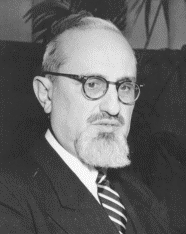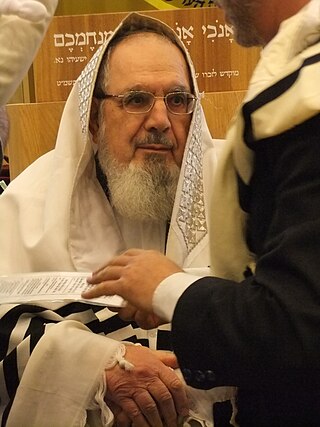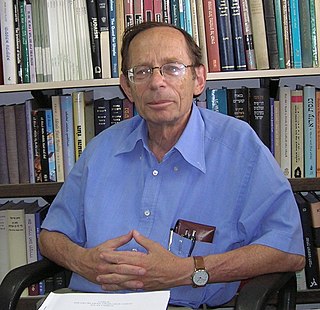Related Research Articles

Conservative Judaism is a Jewish religious movement that regards the authority of Jewish law and tradition as emanating primarily from the assent of the people and the community through the generations, more than from divine revelation. It therefore views Jewish law, or halakha, as both binding and subject to historical development. The Conservative rabbinate employs modern historical-critical research, rather than only traditional methods and sources, and lends great weight to its constituency when determining its stance on matters of practice. The movement considers its approach as the authentic and most appropriate continuation of halakhic discourse, maintaining both fealty to received forms and flexibility in their interpretation. It also eschews strict theological definitions, lacking a consensus in matters of faith and allowing great pluralism.
Halakha, also transliterated as halacha, halakhah, and halocho, is the collective body of Jewish religious laws that are derived from the written and Oral Torah. Halakha is based on biblical commandments (mitzvot), subsequent Talmudic and rabbinic laws, and the customs and traditions which were compiled in the many books such as the Shulchan Aruch. Halakha is often translated as "Jewish law", although a more literal translation of it might be "the way to behave" or "the way of walking". The word is derived from the root which means "to behave". Halakha not only guides religious practices and beliefs, it also guides numerous aspects of day-to-day life.

Jewish holidays, also known as Jewish festivals or Yamim Tovim, are holidays observed in Judaism and by Jews throughout the Hebrew calendar. They include religious, cultural and national elements, derived from three sources: biblical mitzvot ("commandments"), rabbinic mandates, and the history of Judaism and the State of Israel.

The subject of homosexuality and Judaism dates back to the Torah. The book of Vayikra (Leviticus) is traditionally regarded as classifying sexual intercourse between males as a to'eivah that can be subject to capital punishment by the currently non-existent Sanhedrin under halakha.

The role of women in Judaism is determined by the Hebrew Bible, the Oral Law, by custom, and by cultural factors. Although the Hebrew Bible and rabbinic literature mention various female role models, religious law treats women differently in various circumstances. According to a 2017 study by the Pew Research Center, women are slightly more numerous among worldwide Jewish population (52%).
A rabbi is a spiritual leader or religious teacher in Judaism. One becomes a rabbi by being ordained by another rabbi – known as semikha – following a course of study of Jewish history and texts such as the Talmud. The basic form of the rabbi developed in the Pharisaic and Talmudic eras, when learned teachers assembled to codify Judaism's written and oral laws. The title "rabbi" was first used in the first century CE. In more recent centuries, the duties of a rabbi became increasingly influenced by the duties of the Protestant Christian minister, hence the title "pulpit rabbis", and in 19th-century Germany and the United States rabbinic activities including sermons, pastoral counseling, and representing the community to the outside, all increased in importance.
Modern Orthodox Judaism is a movement within Orthodox Judaism that attempts to synthesize Jewish values and the observance of Jewish law with the secular, modern world.

Joseph Ber Soloveitchik was a major American Orthodox rabbi, Talmudist, and modern Jewish philosopher. He was a scion of the Lithuanian Jewish Soloveitchik rabbinic dynasty.
The Committee on Jewish Law and Standards is the central authority on halakha within Conservative Judaism; it is one of the most active and widely known committees on the Conservative movement's Rabbinical Assembly. Within the movement it is known as the CJLS. The current chairman of the CJLS is Rabbi Pamela Barmash.

David Golinkin is an American-born conservative rabbi and Jewish scholar who has lived in Jerusalem since 1972. He is President of the Schechter Institutes, Inc., President Emeritus of the Schechter Institute of Jewish Studies and Professor of Jewish Law at the Schechter Institute of Jewish Studies in Jerusalem, Israel.

Shlomo Moshe Amar is the former Sephardic Chief Rabbi of Israel. He served in the position of Rishon LeZion from 2003 to 2013; his Ashkenazi counterpart during his tenure was Yona Metzger. Since 2014, he currently serves as the Sephardic Chief Rabbi of Jerusalem.

Nachum Eliezer Rabinovitch, born Norman Louis Rabinovitch, was a Canadian-Israeli Religious Zionist rabbi and posek. He headed the London School of Jewish Studies from 1971 to 1982, and the hesder yeshiva Birkat Moshe in Ma'ale Adumim from 1982 until his death.

Bradley Shavit "Brad" Artson is an American rabbi, author and speaker. He holds the Abner and Roslyn Goldstine Dean's Chair of the Ziegler School of Rabbinic Studies at the American Jewish University in Los Angeles, California, where he is also Vice-President. He supervises the Louis and Judith Miller Introduction to Judaism Program and provides educational and religious oversight for two Camp Ramah campuses, Ojai and Monterey Bay. He is Dean of the Zacharias Frankel College at the University of Potsdam in Germany, ordaining Conservative/Masorti rabbis for Europe.
Conservative Judaism views halakha as normative and binding. The Conservative movement applies Jewish law to the full range of Jewish beliefs and practices, including thrice-daily prayer, Shabbat and holidays, marital relations and family purity, conversion, dietary laws (kashrut), and Jewish medical ethics. Institutionally, the Conservative movement rules on Jewish law both through centralized decisions, primarily by the Rabbinical Assembly and its Committee on Jewish Law and Standards, and through congregational rabbis at the local level. Conservative authorities produced voluminous Responsa literature.
Criticism of Conservative Judaism is widespread in the Orthodox Jewish community, although the movement also has its critics in Reform Judaism and in other streams of Judaism. While the Conservative movement professes fidelity to Jewish tradition, it considers Halakha to be a dynamic process that needs reinterpreting in modern times. The criticism by Orthodox Jews and traditionalists within the movement itself revolves around the following:
Sexual orientation has been a pivotal issue for Conservative Judaism since the 1980s. A major Jewish denomination in the U.S., Conservative Judaism has wrestled with homosexuality and bisexuality as a matter of Jewish law and institutional policy. As with other branches of Judaism debating the acceptability of sexual orientations other than heterosexuality, Conservative Jews faced both long-standing, rabbinic prohibitions on homosexual conduct as well as increasing demands for change in the movement's policies toward gays, bisexuals, and lesbians. Previously, the Conservative movement had changed its policies toward women, for example, by allowing the ordination of women as rabbis in 1983. Similarly, the Conservative leadership has been asked to stop discriminating against gay, bisexual, and lesbian people. This goal has been partially completed with the approval of the ordination of gay, bisexual, and lesbian rabbis in 2006 and of same-sex marriage ceremonies under Jewish law in 2012; However, the Conservative decision did not call same-sex marriages kiddushin, the traditional Jewish legal term for marriage, because that act of consecration is nonegalitarian and gender-specific. In the traditional kiddushin ceremony, a pair of blessings is recited and the bridegroom gives his bride a ring, proclaiming that he is marrying his bride “according to the laws of Moses and Israel.”.
Reuven Hammer was an American-Israeli Conservative rabbi, scholar of Jewish liturgy, author and lecturer who was born in New York. He was a founder of the "Masorti" (Conservative) movement in Israel and a president of the International Rabbinical Assembly. He served many years as head of the Masorti Beth Din in Israel. A prolific writer in both the Israeli and international press, he was a regular columnist for The Jerusalem Post's "Tradition Today" column. He lived in Jerusalem.
Tza'ar ba'alei chayim, literally "suffering of living creatures", is a Jewish commandment which bans causing animals unnecessary suffering. This concept is not clearly enunciated in the written Torah, but was accepted by the Talmud as being a biblical mandate. It is linked in the Talmud from the biblical law requiring people to assist in unloading burdens from animals.
Jewish vegetarianism is a commitment to vegetarianism that is connected to Judaism, Jewish ethics or Jewish identity. Jewish vegetarians often cite Jewish principles regarding animal welfare, environmental ethics, moral character, and health as reasons for adopting a vegetarian or vegan diet.

Gerald Blidstein was professor emeritus of Jewish Philosophy at Israel's Ben-Gurion University of the Negev. He was the Israel Prize laureate in Jewish philosophy (2006) and had been a member of the Israel Academy of Sciences since 2007.
References
- 1 2 "An Interview of Rabbi Simchah Roth". Jewish Vegetarian Society. 2013-08-24. Retrieved 2019-05-12.
- ↑ "You shall be holy people to Me". www.bmv.org.il. Retrieved 2019-05-12.
- 1 2 "Rabbi Roth: Biography". www.bmv.org.il. Retrieved 2019-05-12.
- ↑ Ellenson, David (2004). After Emancipation: Jewish Religious Responses to Modernity. p. 476. ISBN 9780878200955.
- ↑ "Conservative Halakhah and Homosexuality". My Jewish Learning. Retrieved 2019-05-12.
- ↑ "Dear David". www.bmv.org.il. Retrieved 2019-05-12.
- ↑ "Chief Rabbis to Sell State's Chametz". Haaretz. 2005-04-21. Retrieved 2019-05-12.
- ↑ Sela, Neta (2007-05-08). "Rabbi rules against kissing mezuzot". Ynetnews. Retrieved 2019-05-12.
- ↑ "Torah, she wrote - Jewish World - Jerusalem Post". www.jpost.com. Retrieved 2019-05-12.